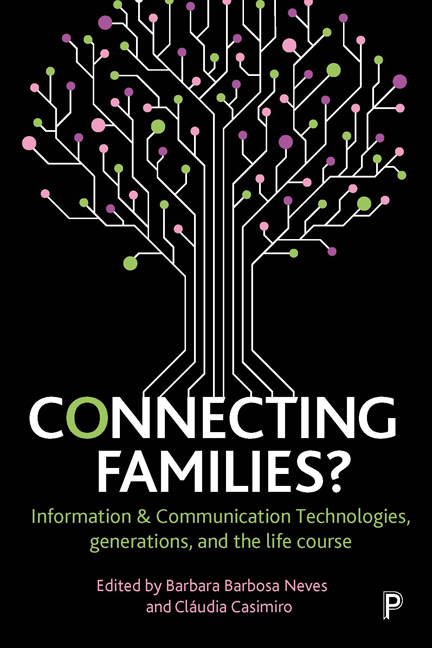Book contents
six - The application of digital methods in a life course approach to family studies
Published online by Cambridge University Press: 22 April 2022
Summary
Introduction
The question explored in this chapter is what analytical elements of the life course approach align with the emerging field of digital methods. To do this, I consider how the emerging field of digital research methods can contribute appropriate tools and techniques relevant to the life course approach. Initially the chapter presents a working discussion of the methodological dimensions of the life course approach to family studies. It illustrates how approaches to life course research, from longitudinal cohort studies to studies of transitions and trajectories across the life course, may draw on data sources, data collection techniques and data analysis approaches that provide openings for the use of digital methods. In essence, it seeks to make the connection between existing practices and possible digital approaches. The caveat here, naturally, is that new techniques do bring the capacity for researchers to ask new questions. In a slightly non-linear way, this chapter considers how conceptual shifts in understanding of digital behaviours may be worthwhile for family studies scholars to consider. For example, literature discussing mediated sociability, computer‒human interactions, computer-mediated communication (CMC) and information and communication technologies (ICTs) has been opened up through the ubiquity of networked software such as social media platforms alongside networked hardware, including mobile devices and wearable technologies. This transition of terminology leads through the internet of human things (IOHT) literature to augment methodological thinking from observational and monitoring techniques to drawing upon the agentive and self-tracking behaviours of the individual. The terminological transitions also reflect recent technological innovations (and their rapid social adoption). This movement of technological change to conceptual change has been captured through the broader notion of digital networked technologies, which incorporate everything from aware refrigerators to the Fitbit. From this veritable Wunderkammer of new technologies for data production, capture and analysis, we move to the considerations a researcher must undertake in order to effectively and sensitively deploy these new techniques and tools in a research study. A focus on the ethical considerations of the use of self-tracking data, for example, may highlight varying perceptions of public visibility and data privacy amongst researched populations. From ethical considerations of digital trace data analysis to the perceptions of the appropriate placements of technologies for data collection within family practice, the researcher faces a participant response minefield of both resistance due to privacy concerns and accelerated acceptance due to novelty.
- Type
- Chapter
- Information
- Connecting Families?Information and Communication Technologies, Generations, and the Life Course, pp. 97 - 112Publisher: Bristol University PressPrint publication year: 2018

